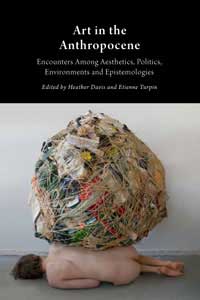Art in the Anthropocene: Encounters Among Aesthetics, Politics, Environments and Epistemologies
edited by Heather Davis and Etienne Turpin

- Critical Climate Change
- Published: 2014
- ISBN: 978-1-78542-008-5
- PDF ISBN: 978-1-78542-000-9
Taking as its premise that the proposed geologic epoch of the Anthropocene is necessarily an aesthetic event, this book explores the relationship between contemporary art and knowledge production in an era of ecological crisis, with contributions from artists, curators, theorists and activists. Contributors include Amy Balkin, Ursula Biemann, Amanda Boetzkes, Lindsay Bremner, Joshua Clover & Juliana Spahr, Heather Davis, Sara Dean, Elizabeth Ellsworth & Jamie Kruse (smudge studio), Irmgard Emmelhainz, Anselm Franke, Peter Galison, Fabien Giraud & Ida Soulard, Laurent Gutierrez & Valérie Portefaix (MAP Office), Terike Haapoja & Laura Gustafsson, Laura Hall, Ilana Halperin, Donna Haraway & Martha Kenney, Ho Tzu Nyen, Bruno Latour, Jeffrey Malecki, Mary Mattingly, Mixrice (Cho Jieun & Yang Chulmo), Natasha Myers, Jean-Luc Nancy & John Paul Ricco, Vincent Normand, Richard Pell & Emily Kutil, Tomás Saraceno, Sasha Engelmann & Bronislaw Szerszynski, Ada Smailbegovic, Karolina Sobecka, Zoe Todd, Richard Streitmatter-Tran & Vi Le, Anna-Sophie Springer, Sylvère Lotringer, Peter Sloterdijk, Etienne Turpin, Pinar Yoldas, and Una Chaudhuri, Fritz Ertl, Oliver Kellhammer & Marina Zurkow.
“This brilliant collection of essays and projects, gathered from all over the world, reflects the limits and possibilities of how visual art might respond to what Sylvère Lotringer describes as a “state of emergency.” Art in the Anthropocene is at once an investigation and an homage to the natural world. It describes what we possess and what we have lost.”Chris Kraus – author of Where Art Belongs
“Art in the Anthropocene is an art book like no other, embracing an extraordinary range of subjects that affect what we call “our” environment. Visual artists are, for once, equal participants in these imaginative, intelligent, and informative discussions of the most pressing issues of our time, and deep time.”Lucy R. Lippard – author of Undermining: A Wild Ride through Land Use, Politics and Art in the Changing West
“Call it the Anthropocene, the #misanthropocene, or something else—there’s a growing recognition that these are damaged times, even if nobody is quite sure how to see, think, or feel them. That’s why Art in the Anthropocene is so important. Davis and Turpin have gathered up the seeds for a whole biome of art and thought about the things that really matter in this world.”McKenzie Wark – author of Molecular Red: Theory for the Anthropocene
“This is a rich, ambitious, and beautifully edited collection that reimagines the Anthropocene as an affective rather than a scientific fact. It touches the very core of our being (post)human—and of the space around us we variously call “the environment” or “the world.” Art in the Anthropocene is vital read for anyone who cares about art, animals, climate, ethics, extinction, justice, plants, poetry and the weather!”Joanna Zylinska – author of Minimal Ethics for the Anthropocene
Editor Bios
Heather Davis is currently a postdoctoral fellow at the Institute for Arts and Humanities at Pennsylvania State University, where she is working on a project that traces the ethology of plastic as a materialization of the philosophic division of the subject and object. Previously, she was a FQRSC postdoctoral fellow in the Department of Women’s Studies at Duke University. She completed her Ph.D. in the joint program in Communication at Concordia University in 2011 on the political potential of community-based art. She has been a visiting scholar in the program in Aesthetics and Politics at CalArts, the Experimental Critical Theory program at UCLA, the Hemispheric Institute of Performance and Politics at NYU, and the Department of Women’s and Gender Studies at Rutgers University. She is the editor of Desire/Change : Contemporary Feminist Art in Canada (MAWA/McGillQueen’s UP, forthcoming 2016). She has written widely about the intersection of art, politics, and ecological disaster. heathermdavis.com
Anna-Sophie Springer, PhD, is a cultural theorist, educator, curator, and publisher whose work weaves artistic practice, environmental humanities, and the histories of science and collecting. Through exhibitions, books, and public programs, she explores how knowledge practices shape cultural imaginaries, ethical responsibilities, and struggles for ecological justice. As co-founder and director of the K. Verlag, an award-winning publishing atelier in Berlin, she develops books as multidimensional sites of collective thinking. She is also the Principal Co-Investigator, with Dr. Etienne Turpin, of Reassembling the Natural, an international exhibition-led inquiry on the role of natural history collections in the Anthropocene, co-editor of the intercalations: paginated exhibitions series and Fantasies of the Library (MIT Press, 2016), and author of Inter folia aves (Greylock, 2024). She completed her PhD, Species of Accumulation and the Necromass of Natural History, at the Centre for Research Architecture, Goldsmiths, University of London. Since 2023, she has been a professor of Transformation Design at the Institute for Design Research, HBK Braunschweig.
Etienne Turpin, PhD, is a philosopher and the general editor with K. Verlag. He also co-edits several series for the publishing atelier, including Processing Process and Pensées soignées; previously, he co-edited the intercalations: paginated exhibition series (2014–25), published by K. Verlag and Haus der Kulturen der Welt in the context of Das Anthropozän-Projekt. Etienne has co-edited several other publications, including The Work of Wind: Sea (K. Verlag, 2025), The Work of Wind: Land (K. Verlag, 2018), Fantasies of the Library (MIT Press, 2016), Art in the Anthropocene (Open Humanities Press, 2015), and Jakarta: Architecture + Adaptation (Universitas Indonesia Press, 2013); he also edited Architecture in the Anthropocene (Open Humanities Press, 2013), based on the landmark design research symposium, The Geologic Turn, which he organized at the University of Michigan.
